A First Look at ROOST East Market
The Philly-based company's properties blur the distinction between a flexible-stay hotel and an actual apartment. Its latest property erases it completely.
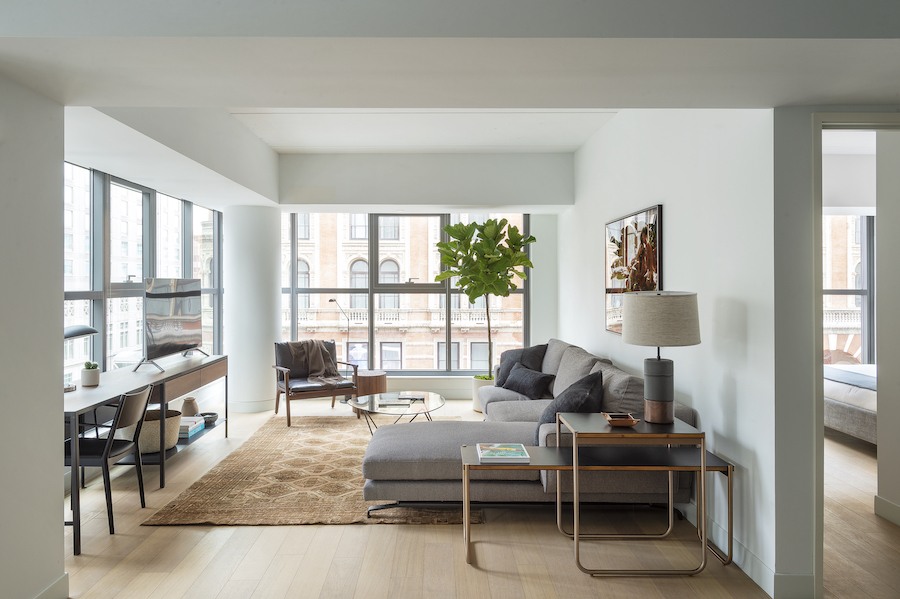
The living room in one of the corner units. The four northwest-corner rooms offer views of City Hall Tower just up Market Street. | Photos: Matthew Williams via ROOST Apartment Hotel / Method Co.
The flexible-stay segment of the hotel industry has grown by offering travelers planning to stay in a place for a while hotel suites that function like apartments.
Philadelphia-based ROOST Apartment Hotels flips this script. It offers apartments that come with the services of hotel suites.
And with the opening of ROOST East Market, the company has managed to erase the distinction between hotel suite and apartment by getting in on the ground floor, so to speak.
Where ROOST’s two existing flexible-stay properties were carved out of existing condominium buildings, the East Market location is an integral part of the brand-new rental apartment building whose lower four floors it occupies, The Girard.
The 60-unit apartment hotel, which welcomed its first guests in January, is ROOST’s biggest to date. Randall Cook, CEO and founder of ROOST parent Method Co., explains that one reason this project completely erases the apartment/hotel distinction is because the architect that has designed the company’s hotels from the start is also the architect of its building: Morris Adjmi.
“Adjmi, who was the architect and designer who did the renovations of our first two locations, was also the building architect, and he did all the kitchen design,” Cook says. “And then we worked with him to custom-design most of the furniture here.”
Adjmi has been integral to ROOST’s sweat-the-details, highly curated approach to designing and furnishing flexible-stay hotel suites. Cook pointed out some of the details on our tour.
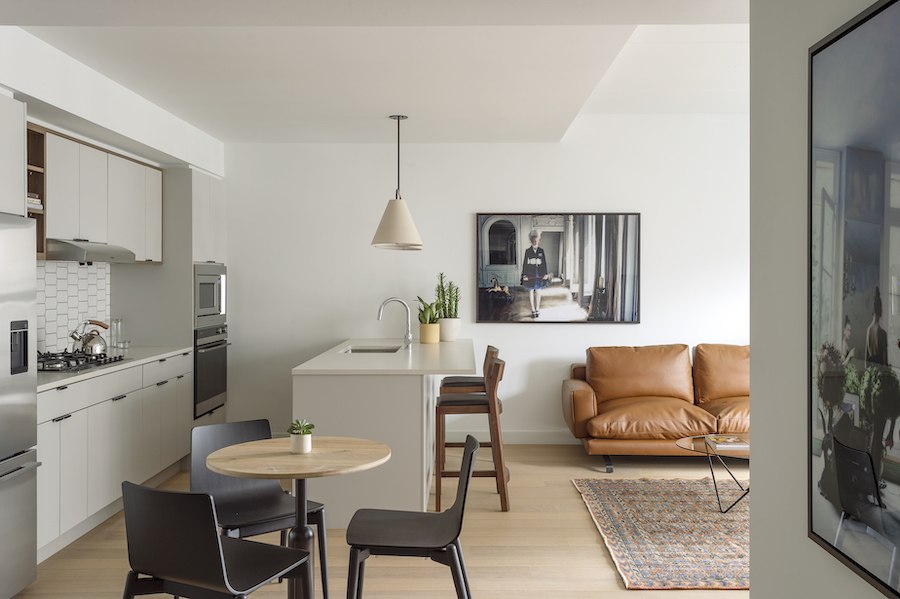
The kitchen in a one-bedroom unit. ROOST East Market’s rooms reflect a midcentury modern aesthetic.
For instance, the walnut bar chairs on the kitchen island match the midcentury modern style of the walnut armchairs in the living room, which in turn are reinforced by a walnut work desk. The colors of the antique Oriental rug on the floor complement those of the furnishings. The result is a unified ensemble where all the pieces work together.
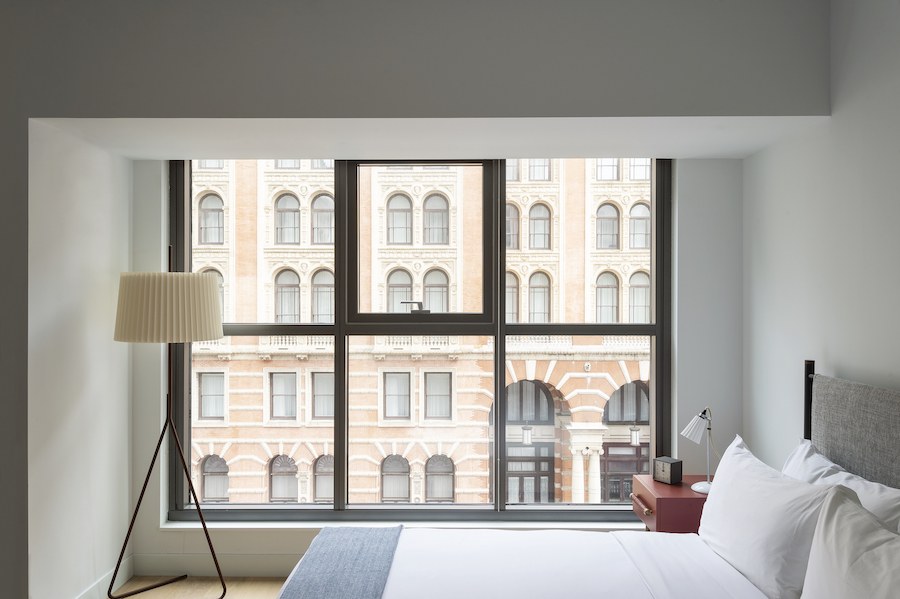
A typical bedroom. The beds were custom-designed by Adjmi for ROOST.
The furniture and fixtures come from several different high-end sources: Coffee tables from Gubi, lighting by the likes of Stone and Sawyer, Gubi and Lumina, armchairs from Stellar Works and Cassina, bedding from Chelsea Textile and bed linens from SFERRA, an Italian startup.
The same attention to detail went into the choice of kitchen appliances (Fisher & Paykel), the dishwashers (Bosch), the cookware (Mauviel) and the coffee guests can make (La Colombe). And forget K-Cups: guests get whole bean coffee and a burr grinder to make their own. (There’s a one-cup ceramic drip cone and pitcher in each kitchen along with a Chemex drip coffemaker.)
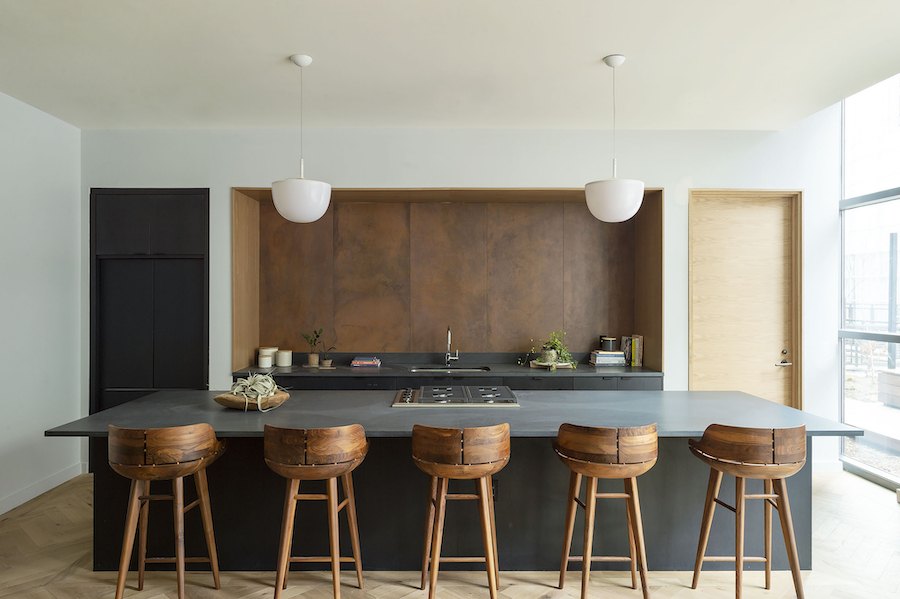
The demonstration kitchen on the amenity floor.
Cook considers the kitchens a way to educate guests about the best stuff that’s out there: “One of the ideas we had is, You come here. You cook on this, learn about this brand. And you realize that, hey, maybe this is nicer than what I was used to at home…. Grinding your own beans makes a huge difference in the quality of the coffee, so that’s one of the reasons why we give people the opportunity to try it.”
As at its other two hotels, no two apartments at ROOST are exactly alike. The artworks that hang in each room and the Oriental rugs on their floors are all one of a kind. Cook works with a New York rug dealer, Old New House, to source the antique rugs.
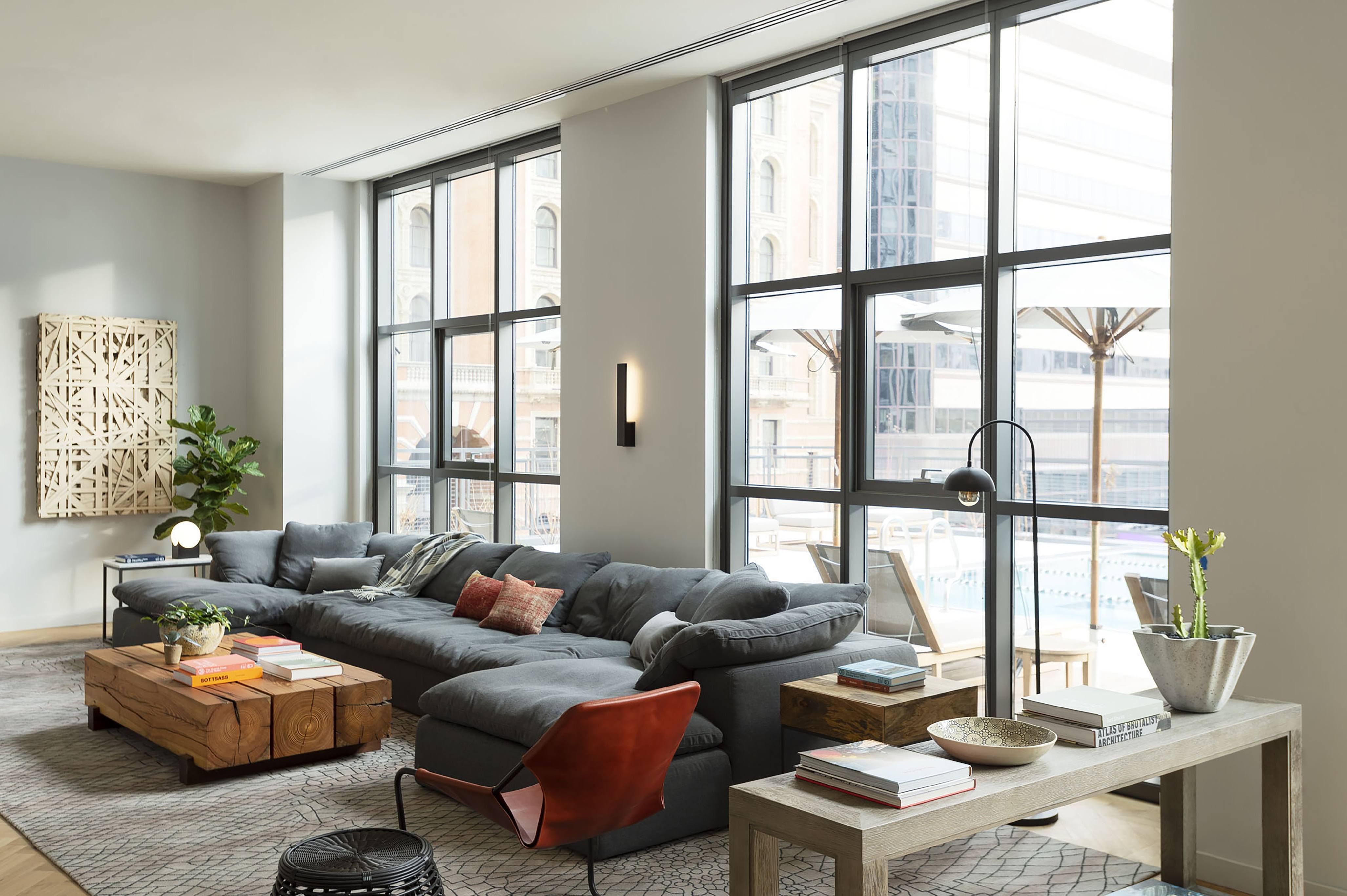
One of the amenity-floor lounges.
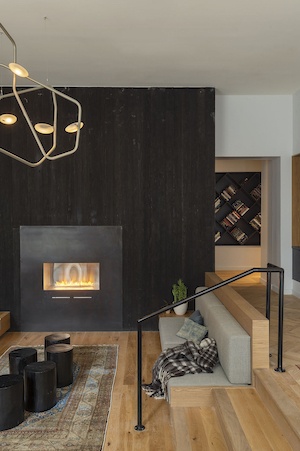
The sunken lounge on the amenity floor.
That high-design, curated experience extends to the amenity floor, which both hotel guests and building tenants use. The 20,000-square-foot floor includes a sunken lounge with fireplace, a sunroom, a billiard room, a demonstration kitchen and dining room, a 24-hour fitness center, a private screening room and a library. The books in both the library and the guest rooms are meant to be read and used.
(Cook chose the guest room cookbooks, again with an eye on offering guests a learning experience: one on cooking techniques or cuisines, one on cocktails and one on coffee. While he didn’t say whether or not he also chose all the library books, chances are he played a major role in their selection as well.)
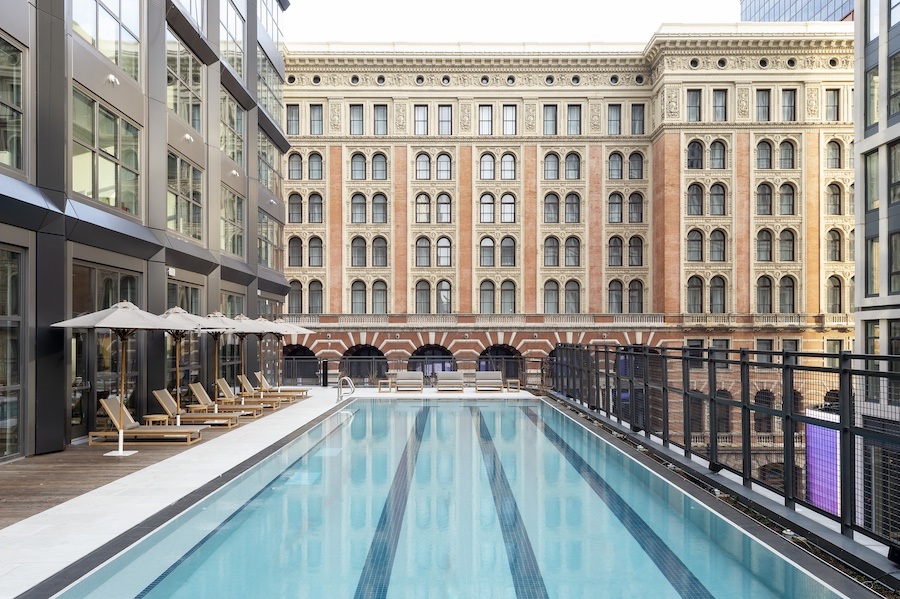
The outdoor pool.
Two terraces flank the amenity floor. The west-facing terrace includes several grills and seating areas, a dog run and a children’s play area. On the east terrace is another grill and a heated 20-meter lap pool.
“It’s the largest outdoor pool in a high-rise on the East Coast,” says Cook. “That’s what I’ve been told.”
And if the in-house fitness center isn’t enough, guests will soon be able to take advantage of the 30,000-square-foot City Fitness gym that’s opening soon on the floor below.
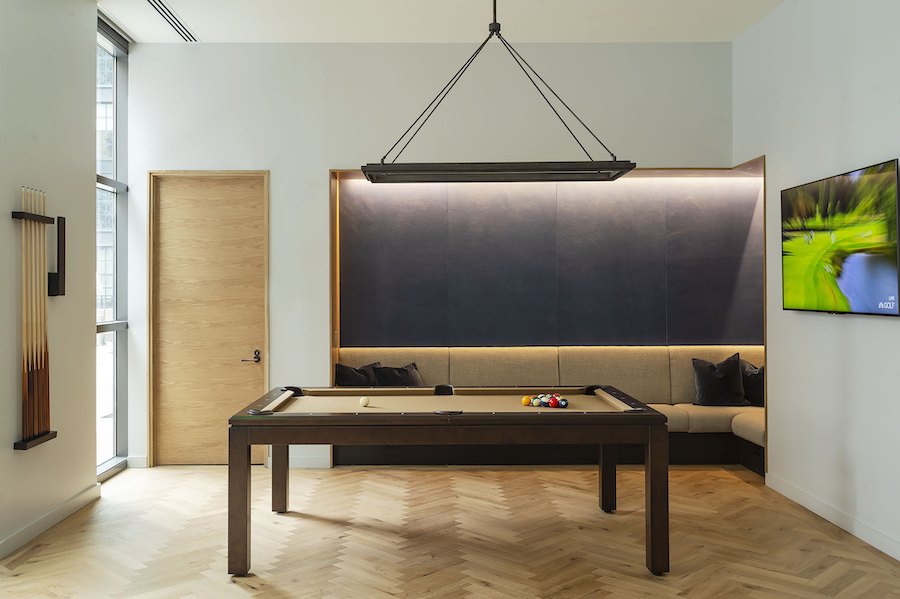
The billiards room on the amenity floor.
While ROOST sees its primary customers as visitors who need a residence in town for several weeks or months, Cook says that short-term visitors also like the “apartment hotel” concept.
“What’s really interesting is that we see people on shorter stays enjoying these types of vacations,” Cook says. “They’re willing to [forego] a doorman or bellhop carrying their bags, but they’ll appreciate having a washer and dryer and a full kitchen.” (While there may be no door guards or bellhops, there is a 24-hour staffed front desk and 24-hour maintenance service. Housekeeping takes place weekly, with a daily housekeeping option available.)
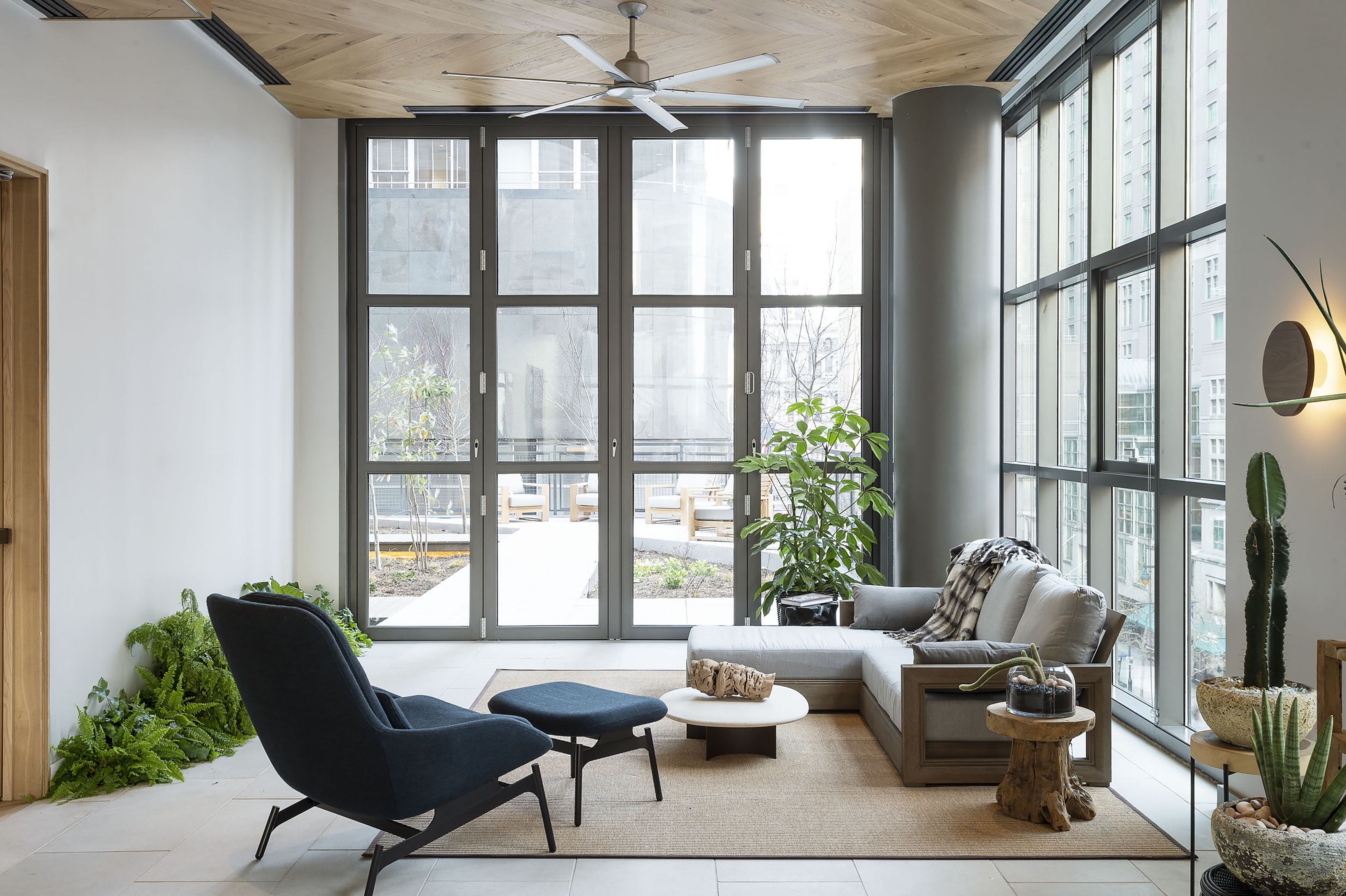
A solarium spans the north side of the amenities floor. The large windows at either end can be opened completely in good weather to create an indoor-outdoor space that connects the two decks.
Cook got his start in the business working for Korman Communities, a pioneer in the luxury extended-stay market, before striking out on his own to develop a high-style approach. (You can read more about how he got into the hotel business and his operating philosophy here.)
The 60 apartments at ROOST East Market come in three configurations: one-bedroom, one-bedroom with den, and two-bedroom. The one-bed-with-den and two-bed apartments have full master suites. And the rooms offer plenty of space: 680 square feet in the 40 one-bedroom units, 806 square feet in the 10 one-bedrooms with dens, and 1,230 square feet in the 10 two-bedroom units.
Room rates are comparable to those in regular upmarket hotels: daily rates start at $235 per night and rates for stays of a month or longer start at $185 per night. Guests give ROOST top rankings: 5.0 on TripAdvisor and 10.0 on Hotels.com.


